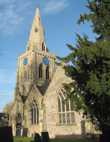 Bingham Bingham
St Mary and All Saints
Bells
There is a western tower containing a ring of 8 bells.
| |
Inscription |
Date |
Size |
Weight |
| 1 |
M & S LONDON
THE CHILDREN OF BINGHAM GAVE ME, 1922
SUFFER LITTLE CHILDREN TO COME UNTO ME |
1922 |
28½" |
4.3.26 |
| 2 |
MEARS & STAINBANK, FOUNDERS, LONDON
H.R.M.HUTT. GAVE ME, 1922.
RING OUT THE FALSE, RING IN THE TRUE. |
1922 |
29¾" |
5.1.3 |
| 3 |
E. MERO MOTU HIC HABITANTUM MDCCXXX
RECAST 1922 |
1730 |
31¼" |
5.3.15 |
| 4 |
FRANNCES WATTES MADE ME
RECAST 1922 |
1589
(?) |
33¼" |
6.3.0 |
| 5 |
THOMAS CHETTLE CHURCH WARDEN 1774
THOS HEDDERLEY FOUNDER |
1774 |
35" |
approx. 7cwt |
| 6 |
GOD SAVE THE CHVRCH 1622 |
1622 |
37" |
approx. 8cwt |
| 7 |
E HANE R BROOKS CHVRCHWARDENS 1743
Tho Hedderley Founder |
1743 |
41½" |
approx. 12¼cwt |
8 in
E flat |
all men that heare my mornful sound repent before you lie in ground
R CAVNT T DEREY G MORELEY WARDENS 1647
GO |
1647 |
45¼" |
14.3.27 |
 The
bells on the ground The
bells on the ground
in the churchyard in 1922
(The clock mechanism
can also be seen here.) |
In 1922 all the bells were brought down and remedial work undertaken on the
tower. The two smallest bells were recast, and the ring was augmented from
6 bells to 8 (the current treble and second being added). The bells were rehung
in the 18th Century wooden frame, but to accommodate the extra bells the frame
had to be repositioned diagonally in the tower and the fourth bell hung in
a cast-iron extension above the third. This means that the ropes need to be
channelled down to the ringing room in markedly angled rope guides.
 Amongst the bells Amongst the bells
(The 4th is hung
above the others) |
The fittings were refurbished by Eayre & Smith in 1982.
The front 4 bells are by the Whitechapel Foundry, 3 and 4 being recasts of
two older bells. The 5th and 7th bells are the work of Thomas I Hedderly of
Nottingham, the 7th being one of the earliest bells by him. The 6th bears the
badges used by George I Oldfield and Paul Hutton. Hutton was a foreman founder
associated with the Nottingham founders from c1606 to his retirement
in 1647. The tenor bell is the work of George I Oldfield, it also bears the
initials GO which probably indicate his son George II.
 Summary details Summary details
displayed in the
ringing room |
 Cut-away
drawing Cut-away
drawing
of the tower |
The previous 3rd (then the treble) was probably by Daniel Hedderly in 1730,
and the old 4th was cast by Francis Watts of Leicester. It is by repute an
Armada bell cast in 1589 which would make Bingham one of the earliest rings
of 5 in the county. (Although the foundry was in Leicester, Francis Watts was
a native of Bingham and is believed to be buried in the churchyard, but his
grave cannot be located.)
There would appear to be an early tradition of ringing here. In fact the
enthusiasm of the ringers landed them in the Archdeacons Court:
Tuesday 15th November 1782.
Against John Baxter son of Samuel Baxter, Wm. Clifton, Joseph Frank, Samuel
Widdowson, William Doncaster the younger and Thomas Wood for riotously going
into the parish Church of Bingham, Ringing the bells and for quarrelling,
chiding and Brawling in the Parish Church and Churchyard of Bingham on Monday
the First day of April last.
The charge was finally dismissed at the next Court. In this way the names
of the majority of the band are known. They were obviously highly competent
for the following report occurred in the Nottingham Journal:
A few evenings ago a young tradesman of Bingham, betted
a friendly bottle of wing, that he rung any one of the six bells in that steeple,
at the first trial thro’ either the peals of Grandsire bob, or college
single bob, BLINDFOLD! the last mentioned peal being fixt upon for him; he
accordingly on Tuesday evening acquitted hinself thro’ the arduous task
almost without a clash upon any of the other bells, to the satisfaction of
all then present.
According to tradition, it was repeated when the Sherwood Youths (the Nottingham
ringers) disbelieved the report.
The leading light appears to have been Samuel Baxter who died on 2nd December
1789, aged 73 years when he was described as ‘a singer and change ringer’.
The Nottingham Journal recorded that after his burial on 6th December
‘a dumb peal of 720 changes Grandsire Bob’ was rung and next day
‘another mourning peal of 720 changes College Single Bob was performed;
which was succeeded by 720 of Oxford Single Bob; the latter with the bells
open.’
|